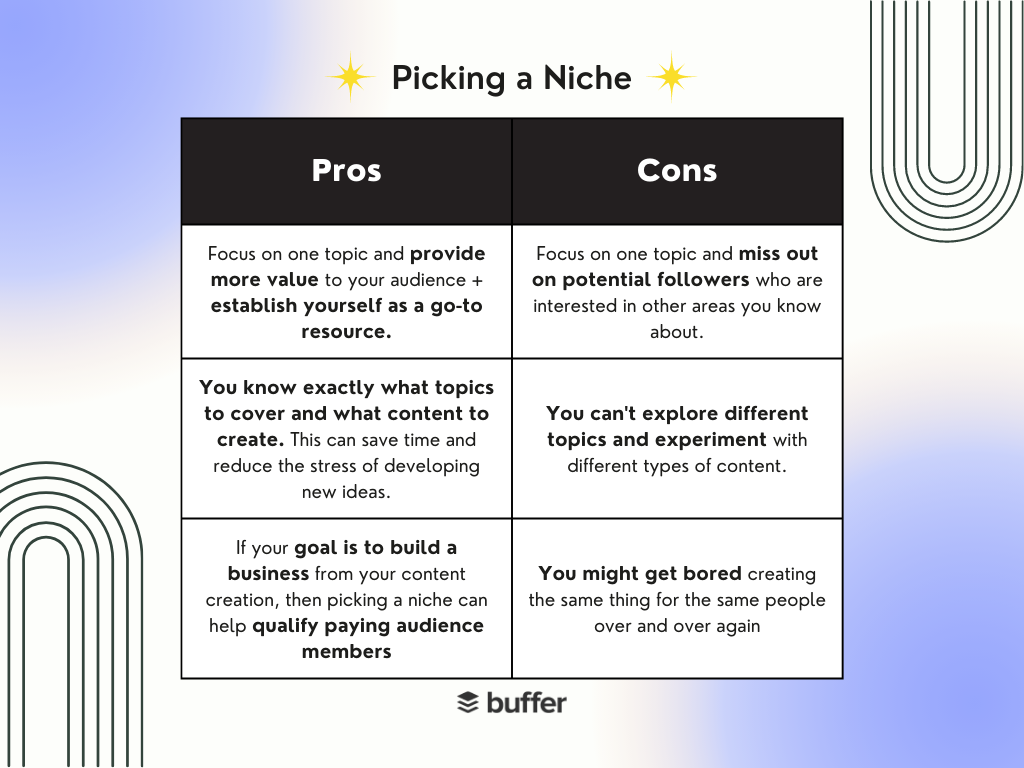What do creators like Mr. Beast and Ali Abdaal have in common? Not much, actually, other than the ‘Creator’ label and being YouTubers. They serve distinctly different audiences and create very different types of content. However, no matter how you look at it, they’re both pretty successful in their own rights.
For content creators , one of the biggest debates is whether or not to "niche down" and focus on a specific topic or audience. Some argue that niching down is necessary for success, while others believe that it's better to have a broader focus.
In this article, we'll explore both sides of the argument and provide guidance on (with input from expert creators) how to pick a niche that works for you.
Arguments Against Niching Down
On the other hand, some argue that niching down can limit your audience and opportunities. If you only focus on one topic, you may miss out on potential followers who are interested in other areas you have knowledge about. Additionally, if your niche becomes oversaturated, it can be difficult to stand out.
Not niching down can also allow you to be more creative and versatile with your content. You can explore different topics and experiment with different types of content, which can keep your audience engaged and interested.
Certain creators feel more comfortable without labels – including Toni Bravo, who says, “...I will never have a niche. [T]here's a million things that I'm always doing at once. So I would post like knitting stuff. And then I post beauty stuff. And then I post up about my dog. And then I just post random trending sounds. So I never put myself in like a box but what I do pay attention to is how things are received.”
@bonitravo yes, i’m a sagittarius
♬ original sound - lucia <3
Jayde Powell, content marketer and creator, adds to this by saying, “I've always been really hesitant to establish a niche because I have a lot of interests. So I'm not going to call myself a vegan influencer or a fashion influencer because maybe I like style and I also like to eat vegan food on occasion. I have a variety of interests and things that I can speak to. So for me, not classifying myself in one way does hinder me from getting opportunities but I'm a big believer that the opportunities that are meant for me will come to me when they're supposed to.”
Arguments for Niching Down
One of the primary arguments for niching down is that it allows you to become an expert in your field. By focusing on a specific topic, you can provide more value to your audience and establish yourself as a go-to resource. This can lead to more opportunities, such as speaking engagements or consulting work.
Josh Ho, founder of Referral Rock and podcaster, thinks about niching down like this: “I agree with niching down because there are a lot of things I'm interested in that I don't write about. If I wrote about all my interests, no one would understand who I’m trying to speak to. It’s hard to separate your interests like that, but it’s worth it when there’s a particular message you’re trying to get across.”
Amanda Natividad, VP of Marketing at Sparktoro, also shared her perspective on niching down.
Them: How do I grow my following?
— Amanda Natividad (@amandanat) March 15, 2023
Me: Say you’ll write about a thing, then write almost exclusively about that thing for 3+ months. Add valuable insights in others’ replies. Lift up others.
Them: Hmm… I don’t want to do that. Is there another way?
Niching down can also make it easier to create content. When you have a clear focus, you know exactly what topics to cover and what type of content to create. This can save time and reduce the stress of coming up with new ideas. If you want to establish yourself as an expert in your field and provide value to a specific audience, then niching down may be the way to go.
So, how do you decide whether or not to niche down? The answer is that it depends on your goals and preferences. For Lloyd George, content creator and founder of Cre8tor Hub, niching down has helped him find a more valuable audience as an entrepreneur. “As someone that has a niche, having a niche has made it significantly easier to grow and I think I've grown faster. Also I will say tangibly speaking, having a niche increases the value of your audience,” he says.
@lloydnotgeorge Maybe your company can do the same??
♬ original sound - Lloyd | Podcast tips
If your goal is to build a business from your content creation, then Lloyd’s advice is pertinent. However, if you prefer to have a broader focus and build a platform based on your personality and not any one category, then not niching down may be better for you.

How to Pick a Niche
If you do decide to niche down, it's important to pick a niche that works for you. Here are some tips for choosing a niche:
Consider your passions and expertise
Start by thinking about the topics that you're passionate about and knowledgeable in. Your clear interest and expertise will help you create better (consistent) content and connect with your audience more effectively.
The key is to “become the niche,” a concept created by Katie Xu, who has a unique perspective on niches. The TikTok creator shares, “You don’t have to eliminate niches or categories – but you shouldn’t hide behind them.
@katiexsocials Replying to @cybergirl.online becoming the niche is a mindset that prioritizes YOU. that’s all #katiexsocials #becometheniche #nichedown #futuremillionairekatie #creatorindustry #socialmillionaire #tiktokmillionaires
♬ original sound - Katie Xu | Future Millionaire
People are trying to learn specific things from you, which is why you might stick to one category. But there are probably thousands of other people in the same category. In order to figure out how you can pick a niche that you’re passionate about, ask yourself:
- Why should they learn from you instead of someone else?
- What makes you, your content or your perspective unique?
- What knowledge or expertise do you have that will make you stand out in that niche?
An example of a creator who has successfully niched down based on their passions and expertise is Pat Flynn, the founder of Smart Passive Income. Focusing on his passion for helping others create passive income streams, Flynn has grown his brand to include a popular blog, podcast, and YouTube channel.
Research creators within your category
Before committing to a niche, it's important to research your competition and make sure there is an audience for your content. Look for gaps in the market or areas where you can provide a unique perspective.
For example, Tom Frank of College Info Geek started his blog as a response to the lack of personal and relatable content for students. By analyzing the existing content and identifying a gap in the market, he was able to create a successful blog with over 1 million monthly visitors.
Be flexible with your niche
Remember that your niche may evolve over time as you learn more about your audience and your own interests. Don't be afraid to pivot if you feel like you're not reaching your goals or if you want to explore new topics.
It took Jason Levin, creator of the newsletter Cyber Patterns, took eight months to figure out what his newsletter would be about. He just wrote what he thought was cool until he landed on content strategy, the main topic of the newsletter.
Time to niche down.
— Jason Levin (@iamjasonlevin) December 8, 2022
Cyber Patterns is zooming in on Content Strategy:
· Patterns across famous creators
· Case studies on brands' strategies
· Developing your long-term content strategy
Expect the same wit and irreverence with a deeper focus.https://t.co/rvSnufQONe
He says about picking a niche: “Picking a niche, in the beginning [of your creator journey], is very silly because you'll probably end up switching. You should definitely pick a niche but don’t rush it until you're ready. Start out following whatever you're curious about and make cool content.”
This flexibility allows creators to adapt and grow as their interests change, ensuring their content remains engaging and relevant to their audience.
Niching comes down to where you are in your creator journey
Picking a niche means that: you have a lot of expertise or interest in one area and you can identify your ideal audience quicker and find your 1,000 true fans easier.
Ultimately, it is a personal choice that depends on your goals and preferences. Whether you choose to niche down or not, the key is to create high-quality content that provides value to your audience.
Try Buffer for free
190,000+ creators, small businesses, and marketers use Buffer to grow their audiences every month.




